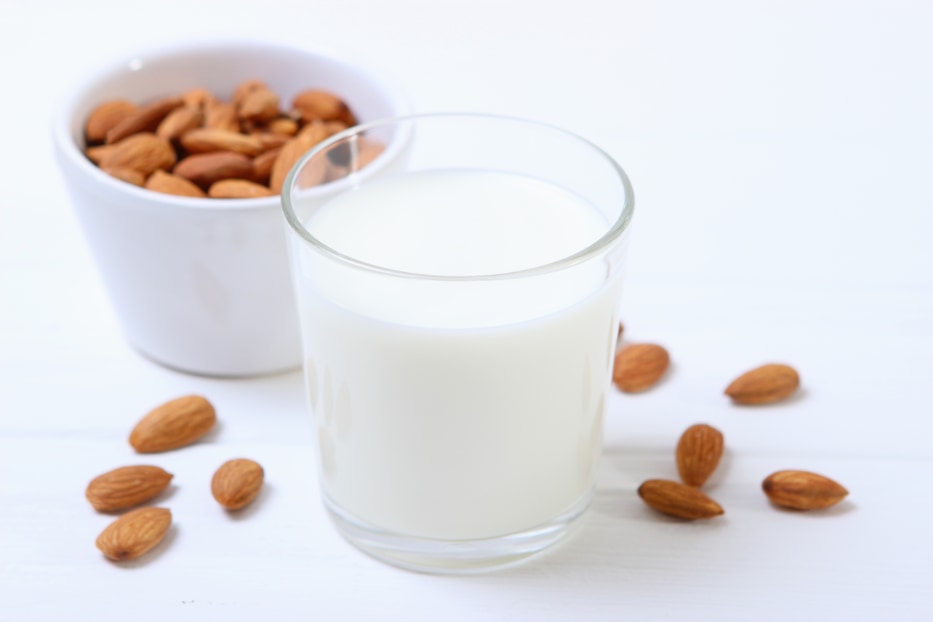Written By Sam Henselijn
The questions about almond milk have tripped up even the most well-read nutrition nerds. From “Is almond milk good for diabetics?” to “Is almond milk healthy?” we’ve got answers to your questions. plus all the necessary information about almond milk that you need to know.
Is almond milk good for diabetics?
Almond milk is a good choice for diabetics because it can be

used as a substitute for cow’s milk and is not likely to cause a spike in blood sugar levels. In addition, Almond milk contains no cholesterol and saturated fat and is also low in carbohydrates, so it supports healthy blood glucose levels.
Ground almonds are the ingredients that make almond milk. This product is high in monounsaturated fats but low in carbohydrates. Monounsaturated fats do not increase blood sugar levels the way that carbohydrates do.
As a result, Almond milk contains only about 1 gram of carbohydrates per cup, which is suitable for people with diabetes.
However, it is essential to understand that most commercial brands of almond milk may contain added sugar or artificial sweeteners. This can make them less suitable for people with diabetes.
Is almond milk good for weight loss?
Yes, almond milk is good for weight loss. Almond milk is a low-calorie beverage containing high levels of vitamins and minerals that help weight loss.
Almond milk is an excellent alternative to traditional cow’s milk for those trying to lose weight because it’s low in calories and sugar and provides essential vitamins and minerals that contribute to a healthy lifestyle.
One cup of unsweetened almond milk has only 30 calories (as compared to 146 calories of 2% cow’s milk) and only 1 gram of sugar (as compared to 12 grams of sugar found in chocolate milk). The sugar found in almond milk comes from natural sources like stevia leaf extract.

Is almond milk healthier than regular milk?
If you’re lactose intolerant, almond milk would be better than regular milk. However, if you have nut allergies, there’s no other option but to drink regular milk.
Almond milk is lower in protein and calcium than regular cow’s milk and is often fortified with vitamins and minerals. It’s also lower in fat, contains little cholesterol, and is free of saturated fats.
Almond milk is a source of vitamin E and manganese, both antioxidants. It also provides iron, magnesium, potassium, phosphorus, and zinc.
Does almond milk have dairy?
The answer is no; almond milk doesn’t have dairy. But it has plenty of other things.
A plant-based beverage made from filtered almonds and water, almond milk is a plant-based beverage. It’s naturally dairy-free and lactose-free, and it doesn’t contain casein or whey proteins — the substances that cause allergic reactions in people who are intolerant to dairy.
However, much almond milk on the market contains additional ingredients like sugar, salt, and preservatives.
How many carbs are in almond milk?
The carbs in almond milk vary from brand to brand, but most varieties contain 1-2 grams of net carbs per serving. Many types of unsweetened almond milk have less than 2 grams of net carbs per serving.
This makes it an excellent choice for those following a low-carb diet (like the Atkins diet), those using keto shakes to lose weight, or those looking to cut back on dairy intake without sacrificing taste.
How many calories are in almond milk?
The amount of calories in almond milk varies depending on the brand and whether it’s plain or flavored. According to the USDA National Nutrient Database, a cup of unsweetened plain almond milk contains 30 calories, while one that is vanilla flavored has 60 calories.
Likewise, a cup of sweetened plain almond milk has 40 calories, while the same amount of sweetened vanilla-flavored almond milk contains 80 calories.

Is almond milk gluten-free?
Unfortunately, not all almond milk is gluten-free. If you have celiac disease, then you need to check the labels of all brands and ingredients before purchasing. Some brands contain traces of gluten, which can be harmful to people with celiac disease.
The best almond milk for celiacs is the one without sweeteners or starches. Manufacturers should also note on their labels if the product is certified gluten-free by a third-party certification program like the Gluten-Free Certification Organization (GFCO). Thus, the product does not contain barley, rye, mixed deamidated wheat starch, or avenin (a protein found in oats), among other items found in wheat.
Conclusion
In short, the answer to the question “Is Almond Milk Good for Diabetics?” is definitely yes. Almond milk is an excellent alternative to cow’s milk. It’s tasty, easy to digest, and has various health benefits. However, it’s not the right choice for everyone. Like it or don’t like it, that’s up to you. It may not be an everyday drink for you either way. But if you decide to try it out or consider adding it to your daily diet, we hope you found our guide helpful.
Will almond milk raise your blood sugar?
Almond milk, particularly unsweetened varieties, generally have a lower impact on blood sugar compared to cow’s milk and sweetened almond milk. However, sweetened almond milk may contain added sugars that can contribute to an increase in blood sugar levels.
What brand of almond milk is best for diabetics?
When choosing almond milk for diabetics, it’s generally recommended to opt for unsweetened varieties to minimize added sugars. Some popular brands that offer unsweetened almond milk include:
–Silk Unsweetened Almond Milk
–Blue Diamond Almonds Almond Breeze -Unsweetened Almond Milk
–Califia Farms Unsweetened Almond Milk
–So Delicious Dairy Free Unsweetened Almond Milk
–Malk Unsweetened Almond Malk
Always check the nutrition label for any hidden sugars and consider consulting with a healthcare professional or a registered dietitian to find the best option that aligns with individual dietary needs and preferences.
Sam Henselijn Author’s Biography – Meet L’Orenta Nuts CEO
Copyright 2024 L’Orenta Nuts
L’Orenta Nuts proudly holds the SQF food safety certification, symbolizing our unwavering dedication to upholding the highest standards of food safety and quality. This certification guarantees that our products undergo rigorous scrutiny, ensuring transparency, traceability, and adherence to global food safety regulations for the utmost consumer confidence.
L’Orenta Nuts has the HACCP (Hazard Analysis and Critical Control Points) certification is a systematic approach to identifying, evaluating, and controlling food safety hazards. It ensures that food products are produced and handled in a manner that minimizes risks and complies with safety standards.
Our GMP (Good Manufacturing Practices) certification ensures that a manufacturing facility adheres to comprehensive quality and safety standards while producing pharmaceuticals, food, and other consumer goods, promoting consistency, quality, and compliance with regulatory requirements.
L’Orenta is an FDA-approved manufacturing facility and has met the rigorous standards set by the U.S. Food and Drug Administration. It demonstrates compliance with regulations, ensuring the production of safe and high-quality food products.
























